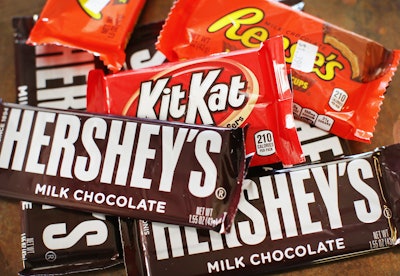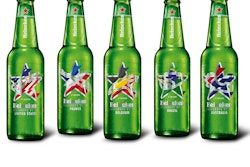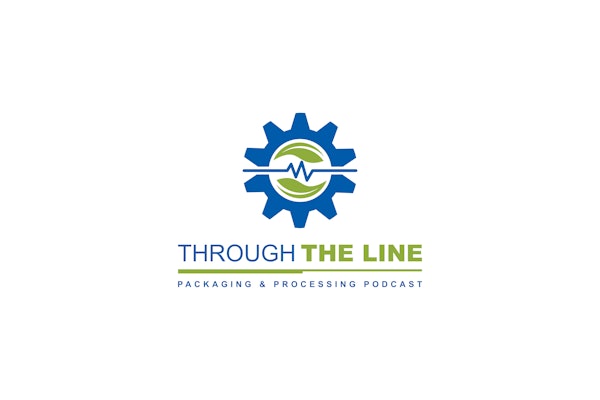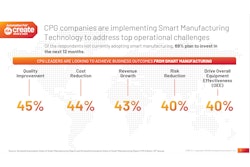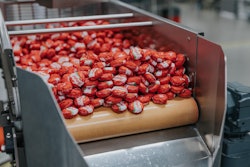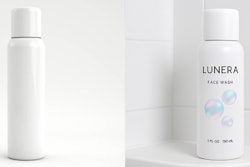Josh Becker has over 23 years of experience in the CPG industry across various roles from supply chain operations, maintenance management, engineering and packaging systems design. His career has provided him a breadth of experience across the food and beverage sector while working for Frito-Lay, Kraft Foods, Bimbo Bakeries USA and currently The Hershey Company for the past six and a half years as Senior Manager Packaging Systems Solutions. He is currently an executive council member of PMMI’s OpX Leadership Network and holds an engineering degree from Penn State University.
Listen to the 12 minute interview here, or continue reading.
Sean Riley:
Hi, I'm your host, Sean Riley. And today we're sitting down with Josh Becker, senior manager of packaging systems at Hershey. As someone who has been on the road and in Hershey facilities around North America, throughout the pandemic, Josh gives us the customer perspective on how Hershey is handling visits from suppliers, training and service issues.
Welcome to the pod Josh.
Josh Becker:
Thanks Sean. Good to be here.
Sean Riley:
Hershey obviously has a presence in more than one location. It's not just Hershey, Pennsylvania, which isn't that far from me. And we've mostly spoken to suppliers or technicians on that end. And you're one of the first end users we've got a chance to speak to. Could you just give us an overview of how someone like Hershey, obviously a pretty big company has been impacted and how your plants have dealt with this pandemic as it's evolved?
"...a good portion of our workforce is working remotely and yet we are still in operation. Candy is being made. Trucks are delivering products to our customers."
Josh Becker:
Well, first of all, Sean, let me state that here at the Hershey company our first priority at the beginning of all of this was to protect the health, safety and wellbeing of each and every one of our employees across our entire organization. That was our top priority and job one. It wasn't just taking best in class safety actions to simply keep our operations going or strict commercial reasons. Our people really came first.
Josh Becker:
With that being our top priority we enabled a proactive approach on employee safety really early on, which really limited any negative impact to our manufacturing plants. We've maintained operations throughout this entire pandemic.
Josh Becker:
Some of the things that we did early on, we limited and restricted travel of any external vendor, supplier, or sales person calling into our office. It wasn't deemed a business critical meeting, we did it virtually. We enabled some work from home policies for some of our management staff and even did management rotations within our facilities just to avoid any potential quarantine events needed by the entire management staffs. Or we tried the social distance as much as we could and implemented PPE early on and just increased the number of hand sanitizing stations, just in general at the beginning, as we started to understand how this thing was going to impact our operations moving forward.
Sean Riley:
Fair enough. A lot of our surveys of our members, we've done webinars, we've done a bunch of these podcasts, they're all really curious, as things start to slowly ramp back up, what are the expectations from a customer like Hershey in regards to things like service? Because a lot of people put service aside, even though for the most part, production is ramped up as food and stuff like that is an essential item. Are you guys allowing technicians into your facilities? Are there specific conditions that would warrant that? Could you just touch on that a little bit?
Josh Becker:
Sure, absolutely. Obviously with our manufacturing plants continuing operation, we are deemed a critical business and need to continue to supply customers and consumers with our products and brands. We are allowing service technicians into our plants. Really, if it's deemed critical to the continuity of operations and projects, but each request is going to be reviewed on a case by case basis.
Josh Becker:
What we're not doing is we're not allowing the use of any mass transit by our technicians visiting our sites. Since at this point, this still is going to require a 14-day quarantine.
Sean Riley:
Okay.
Josh Becker:
However, thankfully in some instances we have several service partners that have local technicians who are local enough to make the drive to some of our manufacturing plants so that we can keep projects and operations moving forward. Obviously it's difficult when some of our suppliers are global, but in one recent instance, we actually had requested a visit by a service technician and the only US-based technician was in the Western part of the country. And we actually allowed him a several day drive into one of our facilities. So we do have technicians in our facilities doing installations, repairs as necessary, maintenance, training, if necessary to be in business.
Sean Riley:
That's interesting because I know we've actually talked to some service and some training experts on some things that people should keep in mind as this starts to ramp back up. And one of the things that was important was making sure you're aware of the expectations of the plant that you're going into. And you guys have outlined that we don't want people flying in being lumped together on a plane like that. And that's something that I know people are curious about. What are your expectations? And you've outlined how Hershey's handling that. How about once they get to your facility? That's another thing they're worried about from an expectation standpoint. Should they build in more time for temperature checks? Should they bring their own things like masks and their own PPE? How are you handling that once somebody, whether it's service or something like that, comes to one of your plants?
Josh Becker:
Well, first off before any technician does travel into our facility we do ask that they complete a health declaration form prior to travel, essentially, just to ensure obviously that they're coming in safe and healthy and not going to have a negative impact on arrival. We do require onsite temperature checks at all of our facilities and that's required prior to admittance to the building. And then we also do provide face masks. We are providing face masks to everybody, employees, visitors, so that each and everyone in the facility does have the same face mask and then face masks are required at all times in the facility.
Josh Becker:
Social distancing is one thing that we're still requiring to maintain as best as possible, but in like the event of some close contact where there's certain instances you can't social distance, we are actually providing face shields. And that's just really to ensure safety of each person working in close proximity. We use that for training, if it needs to be a two-man job maintenance with a service tech we'll ensure that a face shield could be provided and everything. You can't properly social distance all the time. There's certain things that require a two or three or multiple people to complete the job.
Sean Riley:
That's interesting. It seems like you've built it into, you go to a plant and they lay out, you have to have your goggles that they're going to give you, you have to have, some places you have to have booty things over your boots or your shoes. So it's just something like that, where you've worked the mask and stuff like that into that normal, it's nothing different than when you normally arrive at a plant. That's good.
Browse PMMI's extensive COVID-19 Resource page.
Josh Becker:
It's almost like, it feels like it's rolled into just the continued GMP policies.
Sean Riley:
Interesting. I know you touched on it a little bit, but are you having training on a regular basis? Are service techs coming in on regular training or are these things that maybe there's been new hires, maybe there's new equipment where you've had to bring them in. How are you handling training in general, beyond just specific cases? Is it we only need to have it, so we're going to do it then, or is it still a consistent rolling thing that happens all the time?
Josh Becker:
I would imagine we're doing it less than what we would normally do. We wouldn't, I guess review each of them on a case by case basis, but we do have active projects that we are still continuing on installations and preparing for startups. And that is requiring training.
Josh Becker:
Obviously if we can get and accomplish some of the training done virtually in a classroom environment, videos, teleconference, video conference, whereas in the past that might have done in a classroom setting in the plant. We try to do that re virtual and remote. And then if we do need to continue then to do some more training on the floor, that's what I said, we'll supply face masks or face shields. Really, because there's some interaction that you can't, you have to be close as you're explaining some things on a piece of equipment.
Josh Becker:
We've also in the past, we've used headsets. If we have multiple people in our training class, you can't be close to the instructor, but you've got a headset. That's the link to the instructor, he's got a microphone, basically using the headsets. We've done some of that as well. And we're still looking at continuing different ways to remote in virtually and use that for training tools. It doesn't work in every application or situation but I said earlier, it could be used as supplement to make the in-person training safer.
Sean Riley:
The one thing you said that was interesting that I haven't really thought of, you're bringing a person in, but you might then with the headsets and stuff like that, you can spread everybody out almost so he's not in a close, tight environment like that. And that's something that other people haven't really touched on.
Sean Riley:
How about, have you guys had to do any FATs or installations and have you tried any remotely? Because I know that's something that's popped up and people are saying might be the next wave that comes out of this is people are doing a lot of remote FATs versus doing them in person. Is that anything you guys have experienced?
Josh Becker:
We haven't had any remote FATs or virtual FATs yet. We've got some FATs planned for the end of the summer. Obviously we're starting on the development of those plan Bs of "What if we can't travel?" So we're looking through what that could look like.
Josh Becker:
Thankfully some of our suppliers are being faced with virtual FATs now. I think they'll get some of the learning curves and get some of the bugs out of the way. And then if it's something we have to implement later this summer, I think the OEM will be better versed at it and could potentially make it go off a little bit smoother.
Josh Becker:
One thing that is interesting, we are actually working on a project in one of our facilities where we don't have all the technicians we normally would. So we're actually attempting somewhat of a remote/virtual commissioning of the line.
Josh Becker:
The supplier has some local technicians in the US that are traveling to the site, a mechanical and electrical technician, but they're not who are normally sent in this instance. We're actually trying to use different virtual chalkboards and different video technologies to commission a line virtually. I'm not sure how that's going to go. We're doing it later this month, but we're attempting it because we know that we need production. Our products are the back of our consumers so we can't [inaudible 00:00:10:03].
Sean Riley:
That's really proactive from a point of that's still a month from now and you guys aren't just throwing a bunch of people together in a plant. You're going to try different things because you're taking what is obviously a serious situation pretty seriously. And that's good to hear.
Sean Riley:
I'm just curious. And I'm sure that our listeners will be curious, if a company like Hershey, you guys are big, you're well known, you're a well known brand. Are there any best practices that you guys may have picked up during this? Any kind of, I hate to use the term, but silver linings that might've come out of a difficult situation in regard to things that you've learned that have made you guys either more efficient or more effective, or just a better company in general.
Josh Becker:
I mean, I believe that during this time it's certainly pushing us towards using all that technology that's been around for a while that we were either too scared or too afraid to use or didn't see the benefit because it wasn't a necessity at the time. Now those tools are a necessity and we are finding that they are very valuable. That a good portion of our workforce working remotely and yet we are still in operation. Candy is being made. Trucks are delivering products to our customers.
Josh Becker:
I cannot say that this has been an easy time. It has been challenging on many fronts, but we were working with the supplier in the new ways from increased video calls, through remote support. Through virtual startups we are learning to rely on our plant technician teams like never before. I think a silver lining in this is an improved technical competency within our plant technical teams. We can't just call the technician and have them fly out for support at the end of the week to help us through a tough situation. We need to stay engaged in this virtual world, solve solutions together and utilize the tools we either have, or go out and get new tools to solve those problems.
Sean Riley:
That's fantastic. And it's really great to hear someone that's, a company like you guys, that's not just doing it ad hoc. You have this where you've put together a plan and you're sticking to it. And we're really happy that you could find time because I know you're heading out after this to a plant yourself, to take time out of your day, to give people an idea of how you guys are handling it. So I'd just like to thank you again for doing that for us, Josh.
Josh Becker:
That's true. Plans are put together, well thought out from our leadership team and our executive team. And I think it's in the best interest of protecting our employees that are bringing to you. And that's what it really comes down to at the end of the day.
